
__._,_.___
Some extent greed follows aspiration, but you are right 'greed' syndrome in todays BD engulfed the whole society beyond the natural instinct. In my understanding it is mainly due to the lawlessness and absence of regulatory control. Share market created a false hope that attracted the millions but where is the regulatory body, can you deny their function? When the shares value due to artificial demand created by some unscrupulous traders or investors made it run to unusual high what did they do, didn't they have any regulations to control excessive manipulating like everywhere else? How Bangladesh Bank allowed commercial banks to use depositors money, even commercial banks were borrowing from call money market to invest in shares. These are all illegal and this is the way (few among many reasons) the whole market were manipulated by the few not only by their greed factor but criminal intention to lynch the small investors. Small investors were only attracted seeing the profit but only to be lynched infront of the whole government and regulatory machinery. Mr. Hoque, you may blame the poor investors for their greed factors but I wonder how you omit or could not figure out the criminal machination of the regulators in connivance with very powerful and influential share manipulators. I wouldn't call you a AL supporter but please think had the regulatory body, legal and banking system were let work according to the law of the country I am confident that this disastar wouldn't have befall on the millions. You blame the poors who trusting government put all their assets, it is your humanity. Nothing personal. Regards. --- On Tue, 1/3/11, Akhtarul Hoque (ZADCO SUFEMS) <Akhtar@zadco.ae> wrote:
|
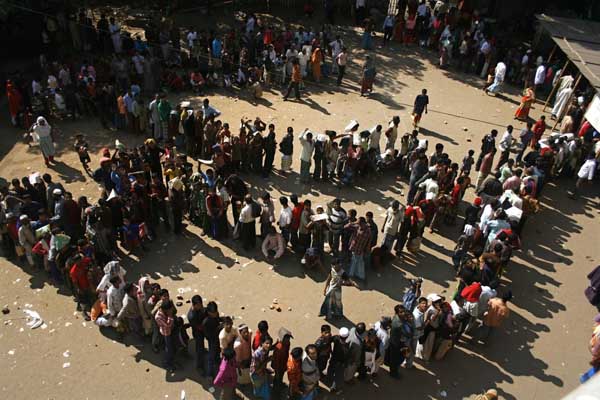
One of the factors that is said to have contributed to the rebellion. The previous government (under emergency rule) had initiated a programme of providing subsidised food to tackle the unprecedented increase in food costs. The army is said to have whisked away huge amounts of money through the programme, while BDR staff complain of not even receiving legitimate payment for extra work. Dhaka, Bangladesh. December 03 2008. Muniruzzaman/DrikNews
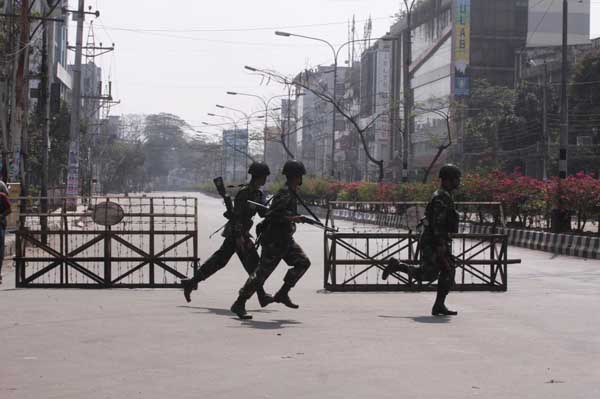
The military cordoned off parts of Dhanmondi in an effort to quell the uprising. Soldiers in Satmasjid Road. Dhanmondi. 9:30 am. 25th February 2009. Dhaka. Bangladesh. Shafiqul Islam Kajol/DrikNews
BODIES of army officers had been found, they had been dumped in the sewage canals that lay underneath the BDR headquarters in Pilkhana. Two dead bodies had been the first ones to surface, far away, in Kamrangirchar.
Three civilians had died too, on the very first day. But as news of fifteen more dead bodies of army officers surfaced the next day, the civilian deaths seemed to pale away.
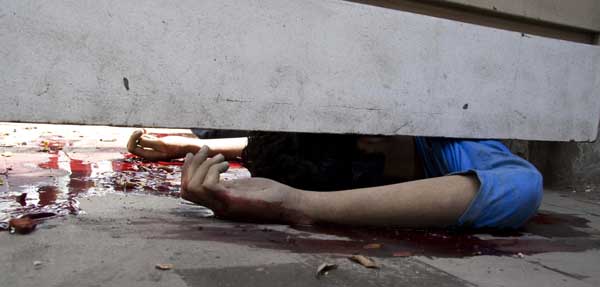
While the extent of the conflict was unclear bodies of slain police and civilians were found. Many lay unattended as sniper fire prevented medical help from reaching. Later bodies of soldiers were found, in water bodies near Dhanmondi as well as in mass graves. 25th February. Dhanmondi. Dhaka. Bangladesh. Adnan/DrikNews
And then a mass grave was discovered in the BDR grounds. Thirty-eight dead bodies were unearthed, including that of the director general Shakil Ahmed. A couple of other bodies were found, killed and dumped in ponds, drains, and sewage lines.
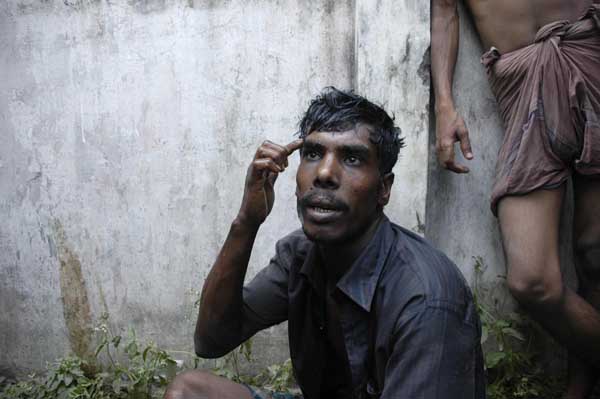
Many innocent civilians got caught up in the fight. Bus helper Muhammad Babu talks of his near escape. One of his compatriots died while two others were hit by bullets. 25th February 2009. Dhanmondi. Noor Alam/DrikNews
As the long hours passed, the whole nation seemed to be holding back its breath, aghast at the enormity of what had happened. At the carnage that had accompanied the rebellion. People gathered around to listen to the radio, watched breaking news spots on television, read aloud newspapers. News travelled through word of mouth. Collective sighs of relief were heaved when family members who had been held hostage were released. But the discovery of more mass graves, the news of family members also having been killed, of the many scores still missing, leave people speechless.
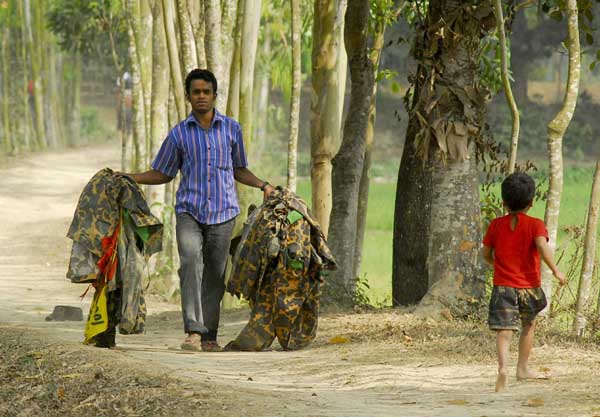
The conflict spread to other parts of Bangladesh. The BDR of Baitul Izzat BDR Training Centre, Satkania, rebelled on the 26th February. There was heavy gunfire inside the camp 9.30 am spreading panic in the area. After the shooting BDR took control of the training centre. BDR claimed that army started the gunfire. Trainee BDRs discarded their uniforms and ran away to nearby villages. Chittagong, Bangladesh. February 27 2009. Raj Aniket/DrikNews
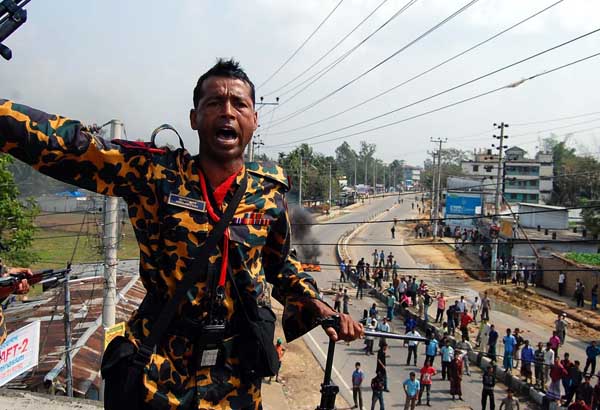
As the conflict spread, rebel BDR soldiers took position with heavy guns in Sylhet BDR camp. 26th February. Sylhet. Bangladesh. A H Arif/DrikNews
Horror, incredulity, and a sort of numbness have set in. Scores still remain missing, as the gagging stench of decomposing flesh hangs over Pilkhana grounds.
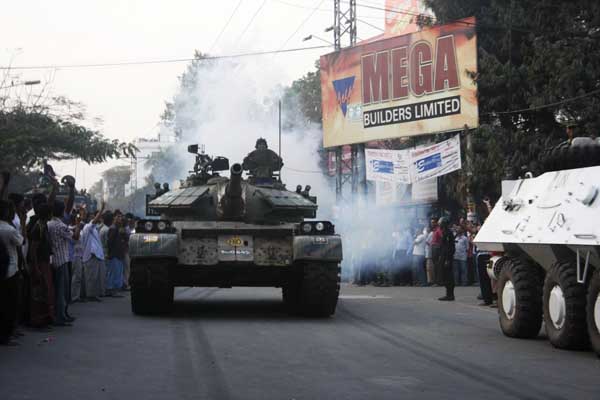
After the military was initially kept back, tanks were deployed. More than 10 tanks and one APC (armed personnel carrier) took position in front of Abahani sports ground, while soldiers took position inside the field. 26th February 2009. Amdadul Huq/DrikNews
How could the jawans go on such a killing spree to right the wrongs done to them? What on earth could have possessed them? These are questions that are repeated endlessly by people in all parts of the country. Yes, they did have grievances (over not being given full rations, not being sent abroad on UN peacekeeping missions, over low pay, unpaid daily allowances promised for extra duties rendered, recruitment from the army to the higher, decision-making positions, etc, etc) but surely, their course of action was disproportionate by all accounts. Not to mention, suicidal (as I write, the idea of disbanding the BDR is being considered).
Is there more to it than meets the eye? In a crisis as grave as the one that faces the nation now, where does one seek answers to the truth? It is better to know some of the questions than all the answers. But what if some of the questions being raised are seen, especially by powerful sections, as blaming the victims of the tragedy? Do we have the resources, the intellectual capacity, the political will, and above all, the courage, to raise the right questions? Will these be tolerated, in moments of such deep grief, where passions rage high?
Were unseen forces at work? Wild conspiracy theories are doing the rounds. Do these not block off hard-headed attempts at understanding whether unseen forces were really at work? Surely we need to know the truth, in the interests of the nation-state, and in the interests of the survival of the many millions who live within its boundaries. It is a nation whose citizens are proud of their hard-earned and fought-for independence, and of their sovereignty, notwithstanding the deep fractures that cause long-standing divisions.
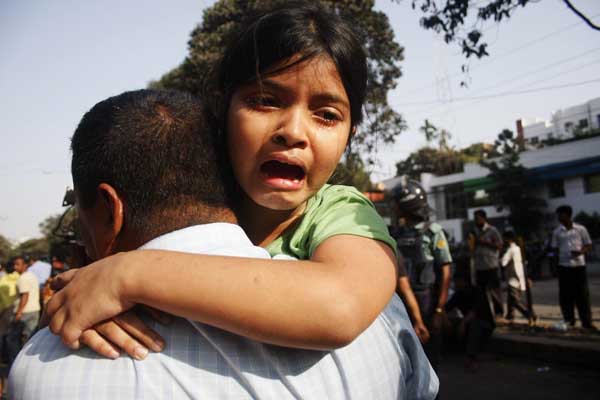
A girl just released from the BDR headquarters in Dhaka. Bangladesh. 26th February 2009. Amdadul Huq/DrikNews
I see women and children seated on the pavement or standing outside the BDR gates, keeping long hours of vigil, for news of their loved ones. I see a few faces break down in tears as yet another body is identified. I see some women reach out to console, while others, who still have shreds of hope, lower their heads in shared grief. Hoping against hope that their husbands, or fathers, or brothers or sons will return. Alive.
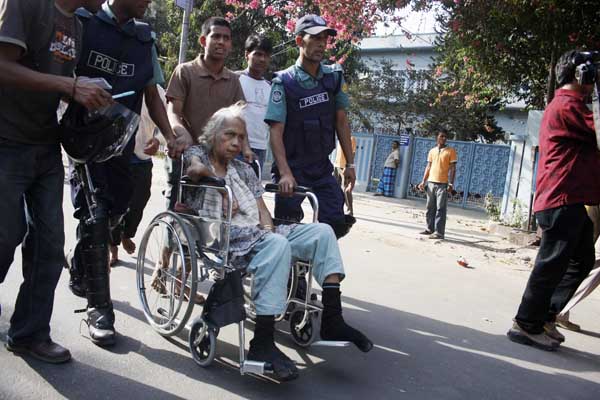
Family members of the hostages were released in front of the BDR headquarters in Dhaka. Bangladesh. 26th February 2009. Amdadul Huq/DrikNews
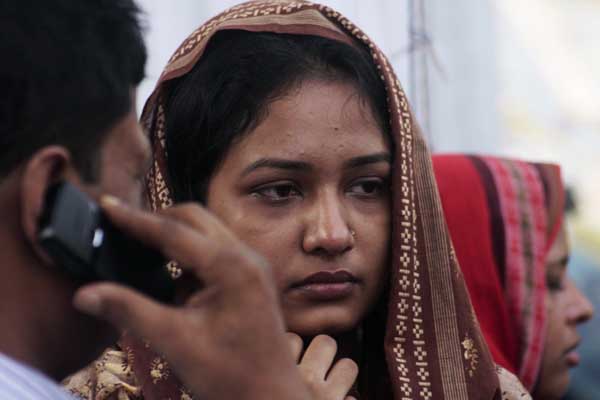
Army tanks moved into the BDR headquarters in Pilkhana. After 33 hours the rebel BDR soldiers surrendered and went back to their barracks, and police and army took over the BDR headquarters. A woman waited outside the headquarters for news of missing relatives. 27th February 2009. Dhaka. Bangladesh. Shafiqul Islam Kajol/DrikNews
I see a mother holding up a wedding photograph of her missing son and his newly-wed bride. I grieve for them, just as I grieve for much-respected inspector general of police Nur Mohammad's daughter, widowed, at two months. Scores remain missing, still.
I read of the Indian government's offer to send a peace mission to give security to the Calcutta-Dhaka-Calcutta Moitree Express that runs between the two cities on Saturdays and Sundays, to be manned by Indian paramilitary forces such as the Central Reserve Police Force, the Railway Protection Force, maybe, even the Border Security Force (The Telegraph, February 27).
I listen to balance in reporting being urged, particularly in the case of the electronic media, since the accusations of the BDR jawans had been highlighted on the first day of the rebellion in some of the private TV channels. It is being said, the other side's version, that of the army officers, had not been sought, that it had not been reported. But surely the lack of press briefings, either from the government or the Home Ministry, or from the ISPR, contributed to this situation? I listen to a discussant argue that command failure, intelligence failure and corruption should not be mentioned. I cannot help but wonder, how does one seek out the truth where such a besieged mentality operates, where collective grief, horror and condemnation can be offered and accepted but only on terms that are acceptable to the recipient? Where narratives of grief and pain and horror seem to be overlaid with other narratives, that of the right to rule.
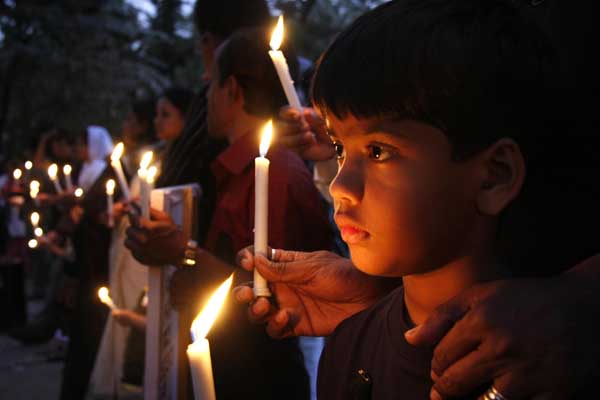
A candlelight vigil to mourn the dead in a park opposite the BDR headquarters. People of all religions offered silent prayers for the victims. 1st March. Dhaka Bangladesh. Amdadul Huq/DrikNews
The dead cannot be brought back to life, nor can the brutal happenings be erased from the nation's history. We can only console the bereaved. We can only learn lessons from it, as a nation.
It is the nation – as a whole – that grieves for the army officers, and their family members. It is the nation that must stay united, since the crisis seems grave enough to threaten our existence. It is the nation that must come together to seek answers, and to discover the truth. A unity of interests must prevail, rather than that of any particular institution. Or else, I fear, we would be doing injustice to those who lost their lives at Pilkhana.
————————
The Language Movement:An Outline
Rafiqul Islam
It has been suggested that the freedom struggle of Bangladesh originated from the Bengali language movement. In a way this is correct, as the basic inspiration for the freedom struggle of the Bengali-speaking people of Pakistan came mainly form linguistic nationalism.
Statistically speaking, the Bengalis were the majority community of Pakistan- about fifty-five per cent of the total population. The Urdu-speaking Pakistanis were mostly immigrants from India. They were mainly concentrated in the city of Karachi, the newly formed capital of Pakistan. The Urdu-speaking people of Pakistan were not more than three per cent of the total population, although Urdu was widely understood and used in West Pakistan. The West Pakistani languages such as Punjabi, Sindhi, Baluchi and Pashtu were written in Arabic script which Urdu and Persian languages both adopted. Bengali or Bangla as we call it, by contrast, had its own script different from that of Arabic or Devanagri script.
The language Controversy:
The language controversy of Pakistan started even before the creation of Pakistan. Dr. Ziauddin Ahmed, a former Vice Chancellor of the Aligarh University of India, had suggested that Urdu should be the state or official language of the future state of Pakistan. Dr. Md. Shahidullah, a noted Bengali linguist from the Dhaka University, opposed the suggestion and put forth arguments in favor of Bengali as the future state language of Pakistan. According to Dr. Shahidullah:
To surrender Bengali to Urdu or Hindi as the language of the court and the university will be a shameful surrender of Bengal.
Dr. Shahidullah's rejoinder was the beginning of the language controversy of Pakistan and the Bengali language movement. As soon as Pakistan came into being, a booklet came out in Dhaka, the capital city of the provinc6 of East Bengal, on 15 September 1947, entitled, Pakistaner Rashtra Bhasha Bangla na Urdu (Pakistan's state language Bengali of Urdu). In that publication it was proposed that
1. Bengali language shall be the following:
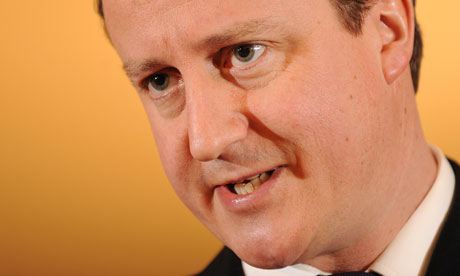
Britain has backtracked from its belligerent military stance over Libya after the Obama administration publicly distanced itself from David Cameron's suggestion that Nato should establish a no-fly zone over the country and that rebel forces should be armed.
As senior British military sources expressed concern that Downing Street appeared to be overlooking the dangers of being sucked into a long and potentially dangerous operation, the prime minister said Britain would go no further than contacting the rebel forces at this stage.
The marked change of tone by the prime minister, who told MPs on Monday that Britain did not "in any way rule out the use of military assets", came as the British-educated son of Muammar Gaddafi mocked Cameron for trying to act as a hero. Saif al-Islam told Sky News: "Everybody wants to be a hero, to be important in history."
In Libya, Gaddafi appeared to settling into a deeper stalemate as attacks by his forces failed to dislodge the opposition from areas of several cities that they hold. A convoy of government aid, which Gaddafi's government said was bound for the eastern city of the rebel-held eastern city of Benghazi, set out from Tripoli . The 20 trucks were carrying food and medicine.
Aid agencies have expressed concerns over how long food will last inside Libya, as the UN high commissioner for refugees said 140,000 people have now fled the country. Tunisian border guards are struggling to cope with the swelling flood of foreign workers trying to get out.
The change in rhetoric from Britain came as the US made clear it would adopt a more cautious approach and European diplomats expressed surprise at Cameron's rhetoric. Hillary Clinton, the US secretary of state, giving evidence to the House foreign affairs committee , suggested military intervention by the US and other countries might be counter-productive.
She said the administration was aware that the Libyan opposition was anxious to be seen "as doing this by themselves on behalf of the Libyan people – that there not be outside intervention by any external force. We respect that."
General James Mattis, the commander of US Central Command, told a Senate hearing: "It would be a military operation. It wouldn't be just telling people not to fly airplanes."
The French prime minister, François Fillon, pointedly remarked that no country could "carry out this operation alone". In a further sign of Cameron's isolation, the White House was dismissive of his suggestion that rebels could be armed. Tommy Vietor, a national security spokesman for Barack Obama, told Reuters: "We believe it's premature to make any decisions of that kind."
Britain made clear it was keeping alive the option of a no-fly zone. William Hague, the foreign secretary, said it could be implemented without the authorisation of the UN security council. "It depends on the situation on the ground," he told the BBC in a reference to the precedent of citing humanitarian need. British military commanders were pressing ahead with detailed contingency plans for a no-fly zone over Libya at Britain's Permanent Joint Headquarters (PJHQ) in Northwood, northwest London. But on the day 170 trainee RAF pilots were made redundant, one official reflected wide concern in British military circles about the risk of another dangerous operation at a time UK forces are stretched in Afghanistan, and against the background of a serious budget crisis to the forces.
In the event of an international agreement to impose a no-fly zone, the UK would deploy Typhoon jets to RAF Akrotiri, in one of the British base areas on Cyprus, officials said. An RAF Awacs aircraft is already deployed in Malta.
But Cameron did back away from the suggestion that rebel forces could be armed. "We should be making contact with and getting a greater understanding of the opposition forces which are now in Benghazi and in control of quite a lot of the country," he said in Downing Street. "We are trying to step up our contact with them so we can get to know them better and know what their intentions are. I don't think we should go beyond that for now."
The US is deploying four naval vessels close to Libya to be available to help with humanitarian aid and any military objectives. The initial focus is on aid and limited military objectives such as disrupting the communications of the Libyan leader.
http://www.guardian.co.uk/politics/2011/mar/01/cameron-backtracks-libya-zone-us
are you really getting any allownce from RAW, or you think...just saying this type of OVER_SMART words, you will have some social elevation?